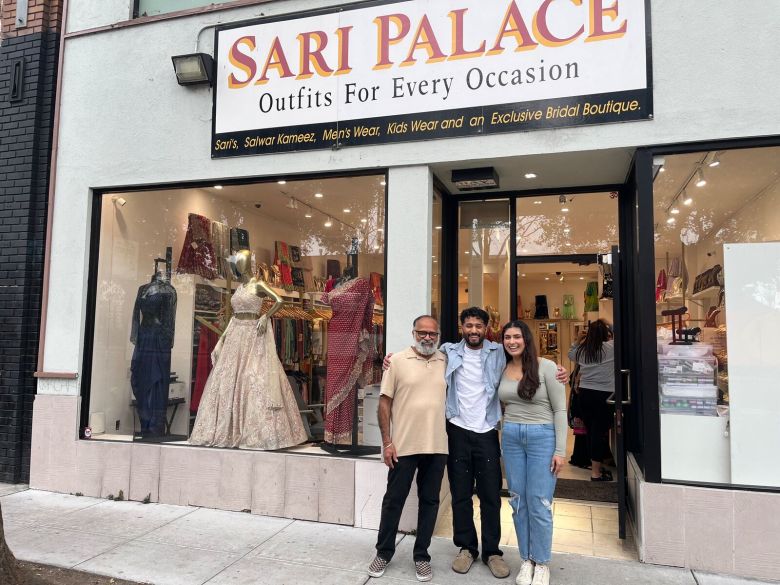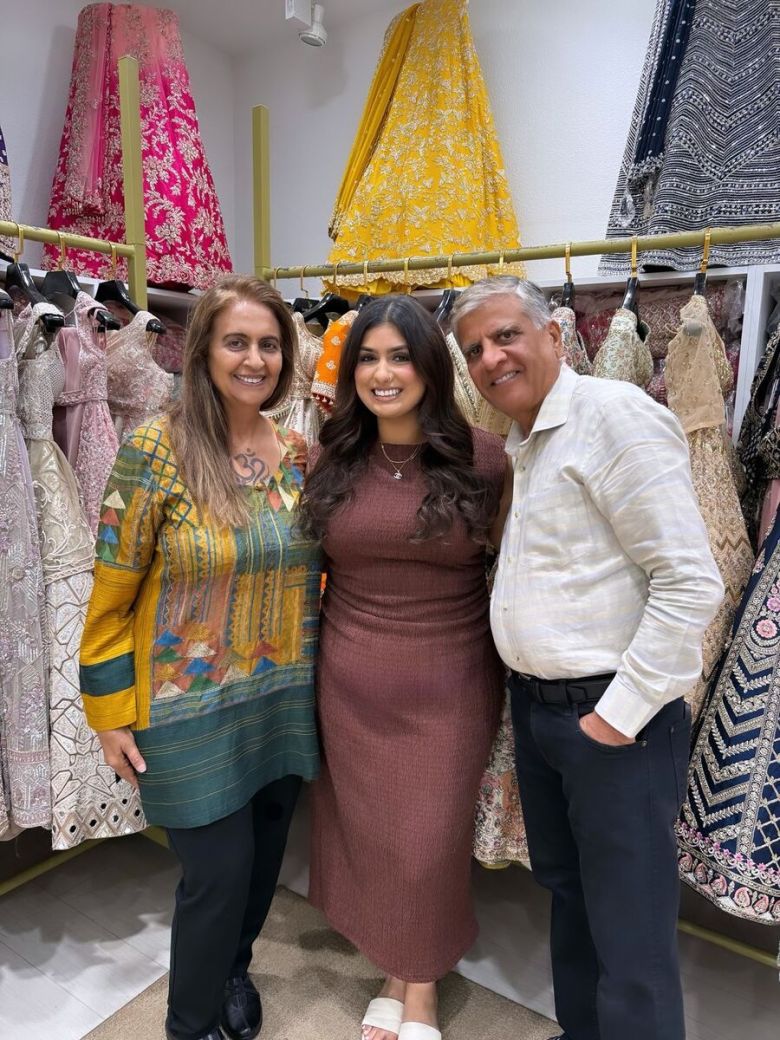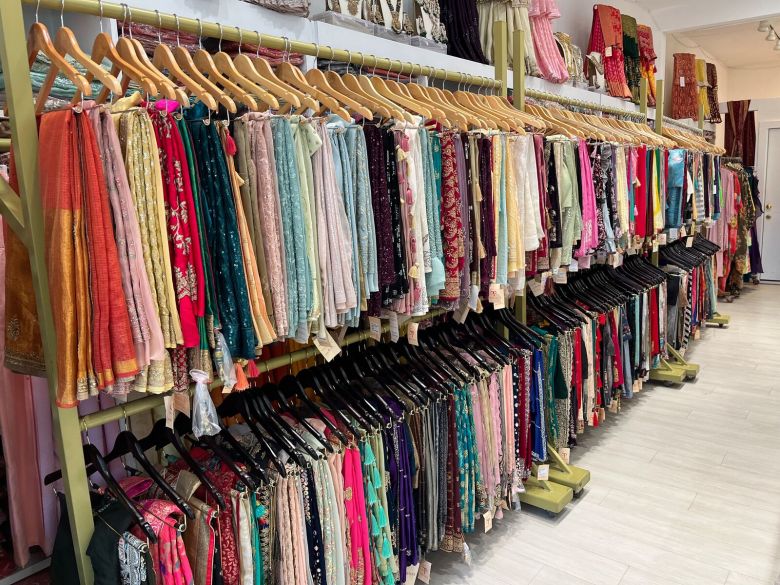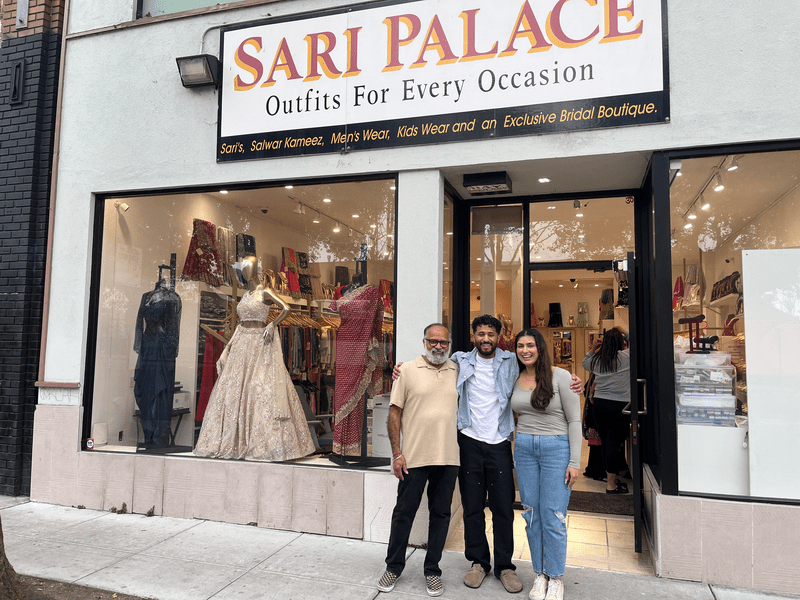 Deepak Ajmani with his children, Manav and Reeya, outside of Sari Palace. The Ajmani family are the new owners of the South Asian boutique. Credit: Nathan Dalton
Deepak Ajmani with his children, Manav and Reeya, outside of Sari Palace. The Ajmani family are the new owners of the South Asian boutique. Credit: Nathan Dalton
After 38 years of running Sari Palace on University Avenue, owners Anil and Asha Thakkar are stepping down. But the South Asian clothing boutique is not going anywhere, and the new owners are no strangers to the shop and the local community.
Shelly and Deepak Ajmani, who own Bombay Spice House and Lishq, which are both located on the same block as Sari Palace, between Ninth and Tenth streets, are the new owners of the boutique, along with their children Reeya and Manav Ajmani.
When Shelly first heard the news about the Thakkars’ retirement, she was in disbelief. She frequented Sari Palace as a child growing up in San Francisco, and is related to Asha Thakkar, whom she calls “Aunty.”
 Asha Thakkar, Reeya Ajmani and Anil Thakkar pose at Sari Palace. The Thakkars are retiring from the South Asian clothing boutique after 38 years. Courtesy: Sari Palace
Asha Thakkar, Reeya Ajmani and Anil Thakkar pose at Sari Palace. The Thakkars are retiring from the South Asian clothing boutique after 38 years. Courtesy: Sari Palace
“The whole world paused for me because I’m like, ‘Wait, this is a legacy to Berkeley,’” said Shelly. “If you guys are gone, what’s gonna happen? And Aunty’s so funny. She goes, ‘I have a plan for that.’ Little did I know she wanted my children to carry on that legacy for her.”
Her children, Reeya and Manav, are both in their 20s, and essentially grew up on the block. Their father took over Bombay Spice House in 1991, a decade before either was born. They both have full-time jobs, but work at Sari Palace in the evenings and on weekends. They love the work and love working with their family.
“I was just submerged in all the culture here,” said Reeya. “ All my outfits have come from here since I was little. So when the opportunity came [to run Sari Palace], we had to do it.”
Sari Palace is constantly brimming with brides-to-be and their family members choosing designs and trying on clothes. A typical Indian bride might need eight different outfits for their wedding celebration. “They design everything with us and then carry everything back to India,” Shelly Ajmani said.
Sari Palace has hundreds of designs that customers can choose from, in a variety of rich colors and patterns that often include intricate beadwork. The shop works closely with each client to create saris, lenghas, dhotis, shararas, gowns, skirt sets, sherwanis and more that are all one of a kind.
Sari Palace’s longtime seamstress was recently deported by ICE
Harjit Kaur worked as a seamstress at the shop for more than 20 years, tailoring many wedding gowns.
This summer, Kaur was deported to India after being detained by ICE. While detained, Kaur said she was made to sleep on the floor, and was denied water, toilet paper, vegetarian meals consistent with her faith, and her medication for several days.
“Everyone has a connection to her,” Heeral Mehta, the Thakkars’ daughter, told NBC News, noting the care she put into her craft.
“It’s crazy, right, because it’s like thinking of someone who made you so happy for one of the best days of your life is now going through this,” said Mehta.
The Ajmanis declined to comment.
Tariffs have taken a toll on the business
The store currently has four employees, not counting the family members, and works with two clothing manufacturers in India. After the manufactures ship the clothing to Sari Palace, seamstresses at the shop alter the garments for a perfect fit. Another Sari Palace located in the Los Angeles suburb of Artesia is run by Heeral Mehta.
Four languages are spoken at Sari Palace – English, Hindi, Gujarati, and Punjabi.
“And we’ll throw in Urdu here and there,” said Shelly. “We try to make sure that we can relate to everybody.”
 Sari Palace has hundreds of designs that customers can choose from, in a variety of rich colors and patterns that often include intricate beadwork. Credit: Nathan Dalton for Berkeleyside
Sari Palace has hundreds of designs that customers can choose from, in a variety of rich colors and patterns that often include intricate beadwork. Credit: Nathan Dalton for Berkeleyside
Recent tariffs on Indian goods, which are currently set at 50%, are having a huge impact on the business. But for the moment Sari Palace is absorbing the added costs.
“That’s the only thing we can do,” said Shelly. “ I don’t think it’s sustainable and we don’t want to pass it down to the consumers at all because it’s not fair.”
Sari Palace started in the late 1980s
Shelly Ajmani often has to call her niece or her parents to come help out. And the Thakkars still come in regularly to help the Ajmani family transition into ownership.
“It’s really a generational family business,” said Reeya. “Everybody’s like family. Even though my uncle and aunt have retired, they’re still very much here and very involved.”
Sari Palace was founded in 1987 on University Avenue, initially located several blocks east of its current location. But it really took off after moving to its current location, an area often referred to as Little India.
The Ajmanis want to make sure that the area remains a vibrant place for Indian and international culture. After Bombay Jewellers closed in 2024, they opened a jewelry and wedding store called Lishq in the same location. Now they are doing something similar with Sari Palace.
“The main thing is we want to keep their legacy as is,” said Deepak Ajmani. “And also on top of that, we want people to come to Berkeley. So people from surrounding cities can come and do one stop shopping for everything. It’s not just us, it’s for the whole community.”
The Ajmanis also helped revive the Berkeley International Marketplace, a moniker originally given to the area in 2006, with funding from the City of Berkeley’s Office of Economic Development, designating West Berkeley as a “vibrant hub for international food and goods, reflecting the area’s diverse cultural tapestry.”
Sari Palace, 1000 University Ave., Berkeley. Phone: 510-841-7274. Hours: Tuesday – Friday, 10:30 a.m.-6 p.m.; Saturday: 10:30 a.m.-6:30 p.m.; Sunday: 10:30 a.m.-6 p.m. Connect via Instagram and Facebook.
“*” indicates required fields

